Do you want to get inspiration to design flower beds or gardens in your yard, are looking for a free excursion for your family, or just wanting to enjoy nature? The University of Florida/IFAS Extension campus in Orange County has a beautiful botanical demonstration garden that celebrates all things green in Florida. The botanical gardens are open every day of the year, from dawn to dusk, and are a great way to be outside and learn more about Florida flora and fauna. The garden is located at 6021 S. Conway, Orlando, FL 32812. There is no charge for self-guided tours and plenty of free parking. Guided tours are offered by Extension faculty, staff and Master Gardener Volunteers for a minimal fee. Find upcoming garden tours and other events on Eventbrite www.ocextension.eventbrite.com. Private guided tours are available for groups of 10 or more at $5 per person. Call 407-254-9200 to arrange your group tour. It is recommended that you wear closed-toed shoes when strolling through our gardens.
The Exploration Gardens
The Exploration Gardens were created in 2010 at our Orange County Extension campus to demonstrate Florida-Friendly Landscaping (FFL) Principles https://ffl.ifas.ufl.edu. The principles were created in conjunction with the University of Florida, private industry, government agencies, and concerned citizens to help mitigate storm run-off, protect Florida’s natural resources, and combat water shortages. The gardens are maintained by the two full-time staff members, Dave and Troy, along with our Orange County Master Gardener Volunteers. We have 14 themed gardens that can be explored to learn about finding the right plant for the right place, see unusual plant specimens for Central Florida and get landscape design ideas. View our map of the Exploration Gardens: https://sfyl.ifas.ufl.edu/orange/home-lawns-landscapes-and-gardens/exploration-gardens/exploration-gardens—tour/.
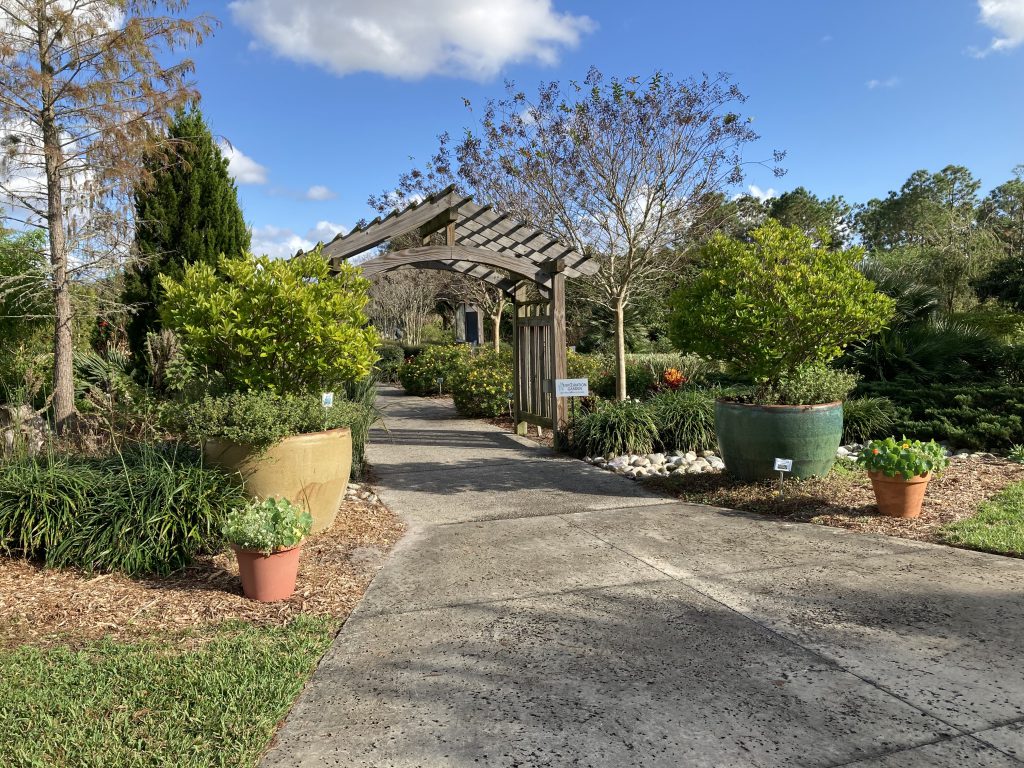
Here’s what you’ll see in our themed gardens with highlighted Florida-Friendly Landscaping principles.
Formal Garden – The Formal Garden gives ideas if you like a more groomed or formal look. Some hallmarks of a formal garden include plants pruned into hedges, a clear design structure, balanced or symmetrical design, and geometric shapes. There is use of symmetry with the arbor and matching landscapes on both sides. Because of the garden’s formal design, it is a good photo spot. This garden emphasizes the FFL tenant of Right Plant, Right Place https://ffl.ifas.ufl.edu/about-ffl/9-principles/principle-1-right-plant-/ and has some great examples of low maintenance plants such as the Flax Lily, which needs no pruning. Additionally, the palms in this garden are frost tolerant including the European Fan Palm and the Everglades Palm. Formal Garden Highlights: Species include blue daze, crepe myrtle, roebilini palm, fashion azalea, Brazilian red cloak, weeping podocarpus, and beautyberry. An Interesting Fact: This is where you’ll find our rose garden, which was planted by the Rose Society of Central Florida and is maintained by Dave Scheck, one of our full-time gardeners.
Pollinator Garden – This is one of our most popular gardens and is designed to showcase how to Attract Wildlife https://ffl.ifas.ufl.edu/about-ffl/9-principles/principle-5-attract-wildlife/. Pollinators are not limited to bees and butterflies; they also include moths, wasps, flies, bats, birds, and other insects. The plants in this garden are mostly native and provide pollinators with nectar, host butterfly larvae (food for caterpillars), and provide shelter for all types of wildlife. There is also a small water feature to provide accessible water for all wildlife. Come back throughout the year to see the different plants in their bloom cycles, and it’s hard to miss our custom-built pollinator hotel in this garden. Using different size tubes and other substrates, this structure provides nesting spaces for solitary bees and wasps, allowing them to lay their eggs or use it for housing. Pollinator Garden Highlights: Species include sunshine mimosa, weeping bottlebrush, Simpson stopper, false indigo, milkweed, and twinflower. An Interesting Fact: You don’t need a pollinator hotel this size in your yard, small versions are available at local stores or online and will serve as perfect homes for your pollinators.
Flower Trial Garden –Something unique to our gardens are the plant trials conducted by the Florida Landscape and Nursery Growers Association (FNGLA) and our Extension Agents. Each March, FNGLA will install new cultivars from flower breeders to have us, and two other sites (Leu Gardens and Disney) oversee evaluations before cultivars are produced and made available to the public. Flower trial Garden Highlights: Currently, we are doing a Florida native wildflower trial evaluating five species (Coreopsis, Butterfly Milkweed, Blanket flower, Tickseed, and Phlox) for suitability for planting in home gardens. An Interesting Fact: One of the new flower beds in the Trail Garden has a new mix of wildflowers called Tia’s Mix after our Florida-Friendly Landscaping Extension Agent Tia Silvasy.
Vegetable Garden –This garden highlights the many methods and techniques available to grow vegetables. There are many different types of beds demonstrated in this garden, including raised beds made of wood, concrete, plastic lumber, and rain barrels. There are Earth Boxes for container gardening, Verti-grow and Hydro-Stacker vertical gardens for small spaces, in-ground gardens with drip irrigation, and square foot gardening boxes. People who don’t like to bend down will like the herb garden on a table at waist height. Vegetable gardens like full sun, good fertility, access to water, and a lot of maintenance. Vegetable Garden Highlights: Species include lettuce, carrots, cabbage, onions, potatoes, cucumbers, beans, squash and a variety of herbs. An Interesting Fact: We solarize (cover with clear plastic for 6-weeks) the main beds about every 3 years to control nematodes. Learn more on solarization https://edis.ifas.ufl.edu/publication/IN856.
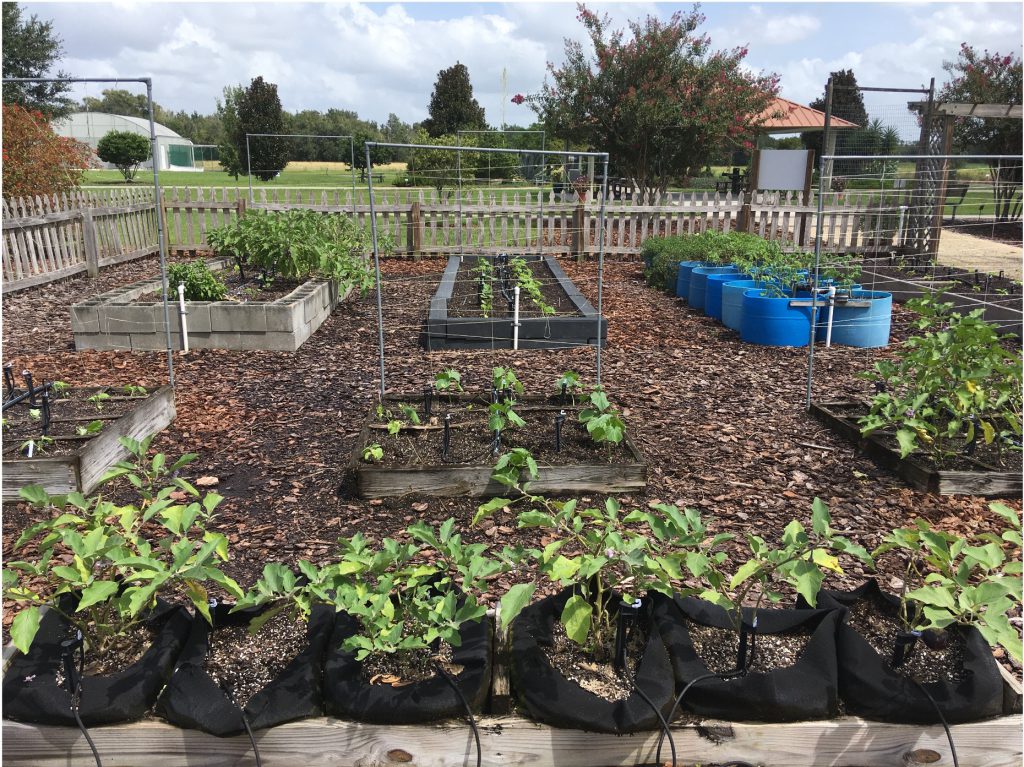
Flowering Tree Garden –The focus of this garden is perennial shrubs and trees that flower and smell good. Like the Pollinator Garden, you’ll learn what trees to plant to have blooms through the year. Two Florida native flatwoods plum trees greet you at the entrance; these provide small fruits that birds love. Flowering Tree Garden Highlights: Species include Banana Bush, Ylang Ylang, Champaca Tree, Nandina, and jasmine. These are low-maintenance Florida-Friendly plants that require little water or fertilizer after establishment following the Florida-Friendly Landscape tenant of Fertilizing Appropriately https://ffl.ifas.ufl.edu/about-ffl/9-principles/principle-3-fertilize-appropriately. An Interesting Fact: The Champaca, a member of the Magnolia family, is used to make the expensive Joy Perfume.
Fruit Tree Garden – Many fruit trees are sensitive to wet feet, or growing in soil too wet, and have not done well here due to the poor drainage of the soil in the garden. We renovated it and added some different species in 2022. We are in zone 9B so we can’t quite grow tropical fruit, but we may do some experimenting with some that are frost tolerant. Fruit Tree Garden Highlights: Species include figs, mulberries, avocado, peach, nectarine, Barbados cherry and guava. An Interesting Fact: Fruit trees have special requirements for fertilizer and chill hours.
Island Garden – This garden started as all grasses and is transitioning to a more diverse plant palette. We have high-efficiency rotary irrigation nozzles installed here that help us Water Efficiently https://ffl.ifas.ufl.edu/resources/ffl-minute-radio/2020-archive/march-2020/ffl-principle–2—water-efficiently/. Island Garden Highlights: Species include native milkweeds, ‘Midnight Magic’ crape myrtle and sunshine ligustrum. An Interesting Fact: The high-efficiency rotary irrigation nozzles are not the only type of irrigation that uses less water; drip lines, hand watering, and microsprays save water too.

Tree Walk- We’ve selected trees that do well in Central Florida to be planted here. Tree Walk Highlights: Species include Red Maple, Olive, Magnolia, River Birch, Eagleston holly, Weeping yaupon holly, ligustrum, and many other trees appropriate for our zone. An Interesting Fact: Some of the trees are deciduous, meaning that they lose their leaves during the winter, while others are evergreen trees that are green year-round.
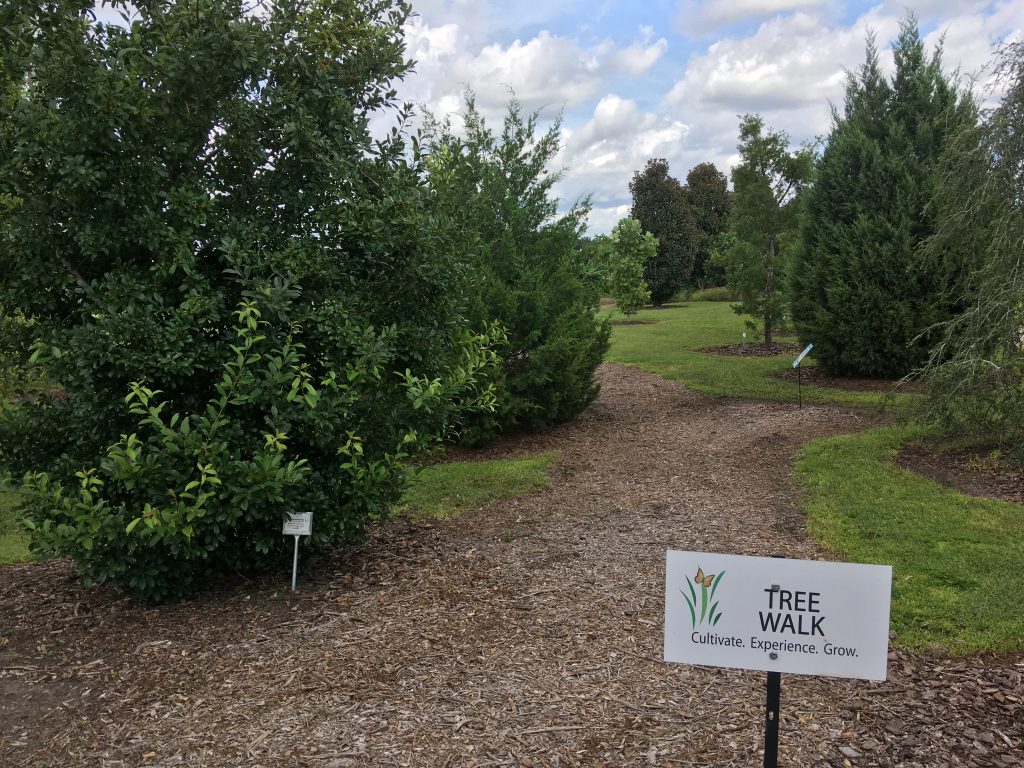
Meadow Garden– This garden is 100% native plants, a replica of a Florida meadow in the wilderness. Meadow Garden self-seeds, meaning that each year the when the seeds come off the plant, they sow themselves back into the soil to grow new plants. Milkweed is an excellent example of a self-seeding plant. Because the Meadow Garden is self-seeding, it maintains itself with minimal help from extension staff. Meadow Garden Highlights: Species include native milkweed, liatris, Rayless Sunflower, Black-Eyed Susan, Chapman’s Senna, and Rattlesnake-Master. An Interesting Fact: The Meadow Garden was created with a grant from the Florida Wildflower Foundation and designed by Andrea England of My Backyard Meadow.
Succulent Garden– Succulents are trending now because they are small, low-maintenance, and look cool. Succulents store water in their leaves, stems and roots and need little to no supplemental irrigation. Because the plants in our succulent garden have limited need for supplemental water, the garden follows the Florida Friendly Landscape principle of Watering Efficiently https://ffl.ifas.ufl.edu/resources/ffl-minute-radio/2020-archive/december-2020/ffl-principle-2—water-efficiently/. Succulent Garden Highlights: Species include echeveria, aloe, hawthornia, and cactus. An interesting fact: All cacti are succulents, but not all succulents are cacti.
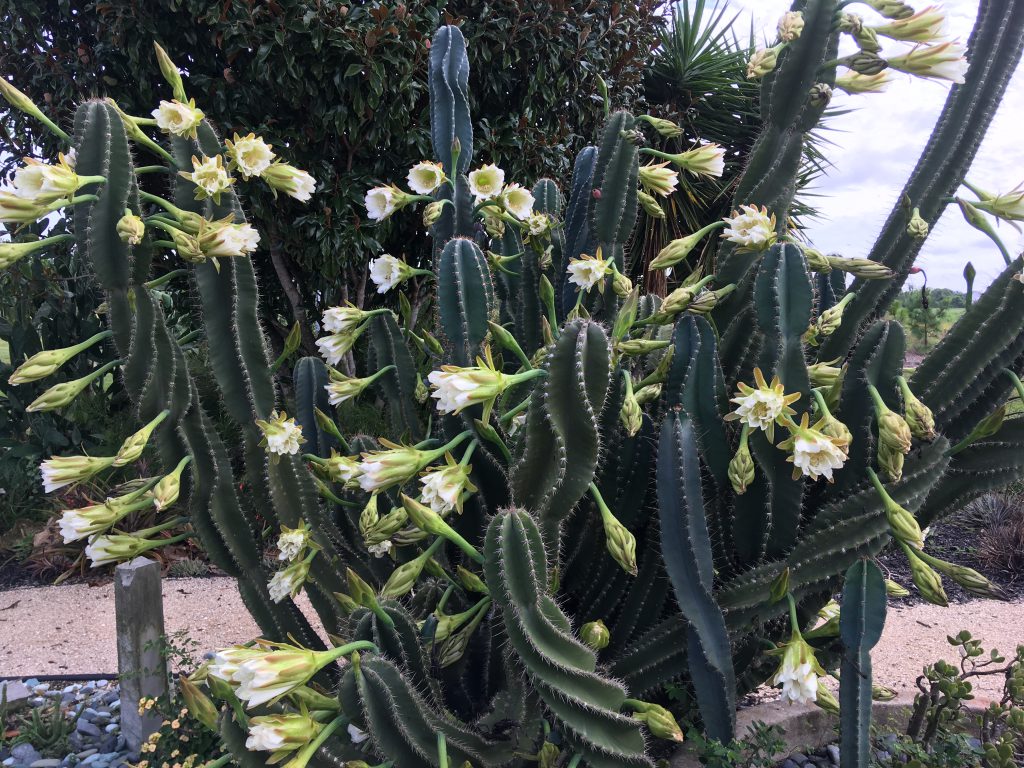
Hops Yard– Hops are a new specialty crop being tested in Florida by University of Florida (UF) for commercial production. Hops are usually grown in the Northwest U.S. because they prefer a cooler climate. Research by UF scientists has shown the hops variety ‘Cascade’ performs the best in our garden and has higher yields than other cultivars due to number of vines to produce hops cones (flowers). Hops Yard Highlights: Currently, the hops garden is in transition. There are studies being done as to why the hops didn’t thrive and what should be tested next. An Interesting fact: The cones contain high levels of essential oils that are added during brewing to give beer its hoppy flavor.
Rain Garden – The rain garden was created in a naturally low and wet spot that collects water when it rains. The low spot was dug out and rocks added to help with water flow into the pond. Rain Garden Highlights: Species include water loving plants such as cypress trees, canna, native Carolina aster, iris, and horsetail. An Interesting Fact: Because this garden becomes the holding area for rain, it follows the Florida Friendly Principle of reducing water runoff https://ffl.ifas.ufl.edu/about-ffl/9-principles/principle-8-reduce-runoff

Shade Garden-While not a formal stop in the Exploration Gardens, the Shade Garden is an excellent example of Right Plant/Right Place. This garden is located along the south side of the administration building, by the Plant Clinic. Many spots in the exploration gardens are in full sun, this garden is in nearly full shade, requiring a very different set of plants. Shade Garden Highlights: Species include caladium, holly fern, Fire-Cracker Jatropha, Cybidium Orchid, and coleus. An Interesting Fact: Many shade plants are very low maintenance.
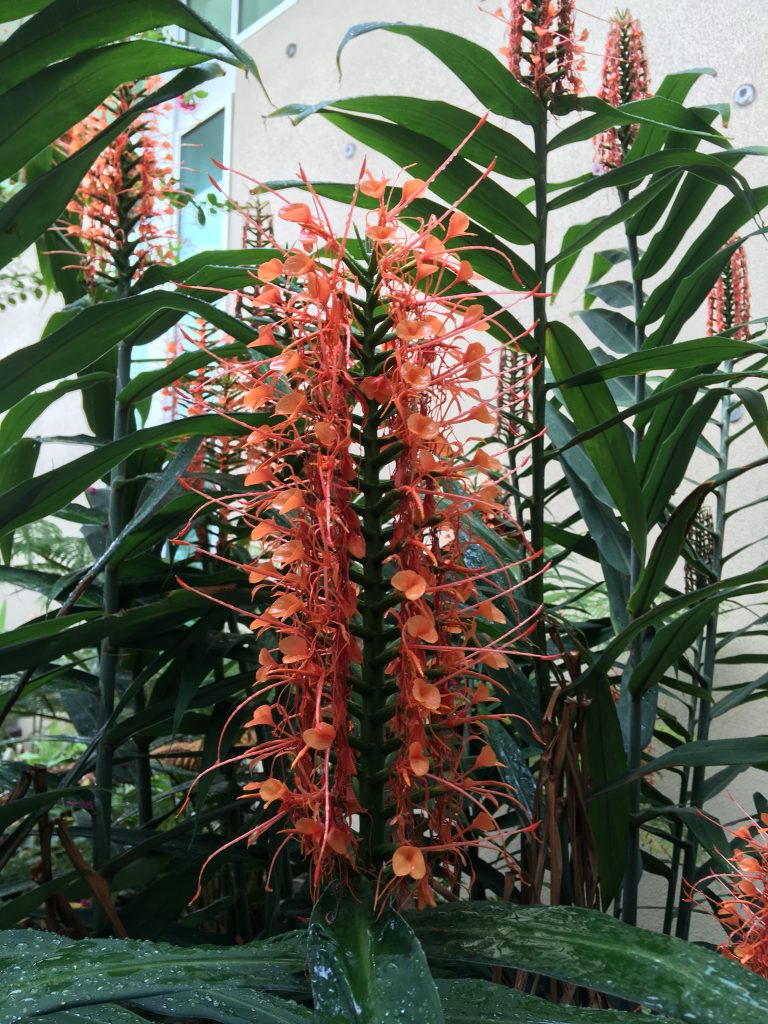
For questions about the Exploration Gardens, please call 407-254-9200 or email Jeanette Mercado, Administrative Assistant, mercadoj@ufl.edu or Tia Silvasy, Florida-Friendly Landscaping Agent, tsilvasy@ufl.edu.
Want to learn more? Check out horticulture classes offered by UF/IFAS Extension Orange County at www.ocextension.eventbrite.com. Read about Florida-Friendly Landscaping™ https://ffl.ifas.ufl.edu/. Follow us on Facebook https://www.facebook.com/GardenFlorida/, Instagram https://www.instagram.com/oc_extension/ and visit our website https://sfyl.ifas.ufl.edu/orange/home-lawns-landscapes-and-gardens/florida-friendly-landscaping/.
 0
0
